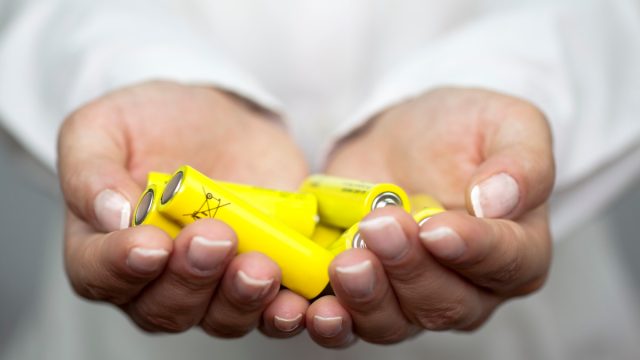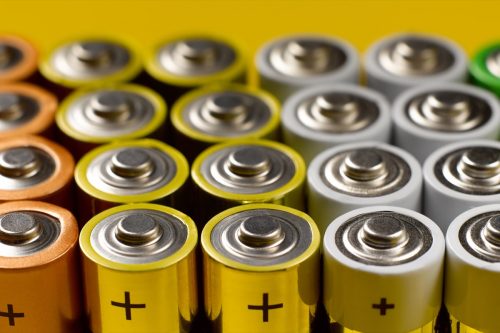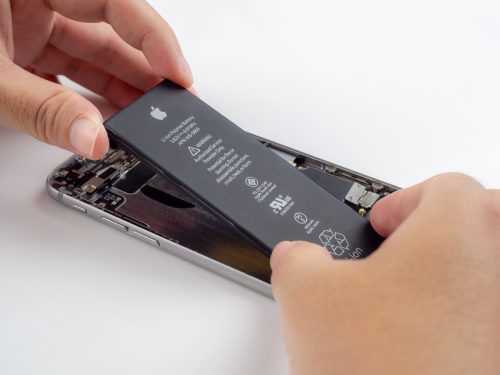If You Notice This on Your Batteries, Don’t Use Them, FBI Says in New Warning

Many of the electronic devices we use daily are equipped with batteries—but as we all know, those batteries don’t last forever. We’ve all had to pause our TV viewing to change out the batteries in the remote, or had to make a bigger investment with a new battery for a laptop that stopped charging. You probably know that all batteries carry risk, albeit minimal, but some of the batteries in your home could be significantly more dangerous than others. Now, the U.S. Federal Bureau of Investigations (FBI) is alerting Americans to a major battery scheme that scammers could be targeting you with. Read on to find out what warning signs you should look for on your batteries.
READ THIS NEXT: Never Do This With Your Phone in Public, FBI Warns.
Battery prices have been increasing.
These days, “almost every device these days has a battery that’s going to wear out, and it’s a built-in death clock,” Kyle Wiens, the CEO of repair community iFixit, recently told The Washington Post. This includes everything from your toothbrush to your AirPods. Unfortunately, batteries have gotten more expensive at the same time. According to Morning Brew, it was estimated that battery prices would rise anywhere from 10 percent to more than 20 percent this year.
“One reason batteries are getting more expensive is that the cost of battery materials, particularly lithium, nickel, and cobalt, skyrocketed beginning in late 2021,” the experts at Morning Brew explained. It’s not just your wallet you need to worry about, however. As a result of this change in the supply chain, the FBI is now warning about battery scams.
The FBI has a new warning about batteries.

On Sept. 30, the FBI released a new public service announcement for Americans, warning them about counterfeit batteries. “Scammers are leveraging the vulnerabilities in the global supply chain, as well as the public’s continuing need for new batteries to sell a wide variety of counterfeits or unauthorized replicas online,” the agency said.
Most electronic devices usually come equipped with an original equipment manufacturer (OEM) battery. “These are batteries that are made by the company that makes the device they are powering,” the experts at BatteryTools.net explain on their website. But according to the FBI, counterfeit batteries do not undergo the same standardized testing as OEM batteries. As a result, this “can adversely impact the safety and health of the consumer,” the agency warned.
RELATED: For more up-to-date information, sign up for our daily newsletter.
Consumers may accidentally buy counterfeit batteries when trying to cut costs.
Since replacing batteries can cost a pretty penny, many consumers turn to aftermarket batteries, which are designed to meet the same needs of a device as the OEM equivalent but are sold at a fraction of the cost. “Manufacturers do not object to third-party suppliers as long as the aftermarket batteries are well built, safe and approved by a safety agency,” the experts at Battery University explain on their website.
Unfortunately, that’s not always the case—which is why the FBI is now alerting Americans to this issue. “In the search for low-cost batteries, consumers may inadvertently purchase counterfeit batteries that are unsafe,” according to Battery University. The FBI said that these batteries can cause injury because they may be “designed improperly, made of low-quality materials, assembled incorrectly, charged improperly, or damaged.”
The agency added, “Consumers using alternative manufacturers or battery types may be at risk of harmful or negative impacts, such as overheating—which can cause fires or explosions and result in personal injury or property damage—poor battery performance, device damage, or complete product failure.”
There are ways to tell if you have purchased a counterfeit battery.

To avoid the dangers that can come from using counterfeit batteries, the FBI advises consumers to always buy from legitimate and trusted sources, “which include authorized dealers or distributors that sell batteries tested by nationally recognized testing laboratories.”
On other other hand, “consumers should avoid all third-party purchases of batteries, as they can appear to be legitimate OEM batteries but are likely counterfeit,” according to the FBI. Signs of counterfeit batteries include those that are not properly packaged, have misprinted or misspelled labels, have labels that peel off, or do have official manufacturer batch numbers.
“It is good practice to compare prices before purchasing. However, batteries sold at deep discounts or at significantly lower-than-average prices are likely counterfeit,” the FBI warned. “Consumers can familiarize themselves with legitimate manufacturers’ designs and look for any significant variations when purchasing new or replacement batteries to avoid purchasing counterfeits.”